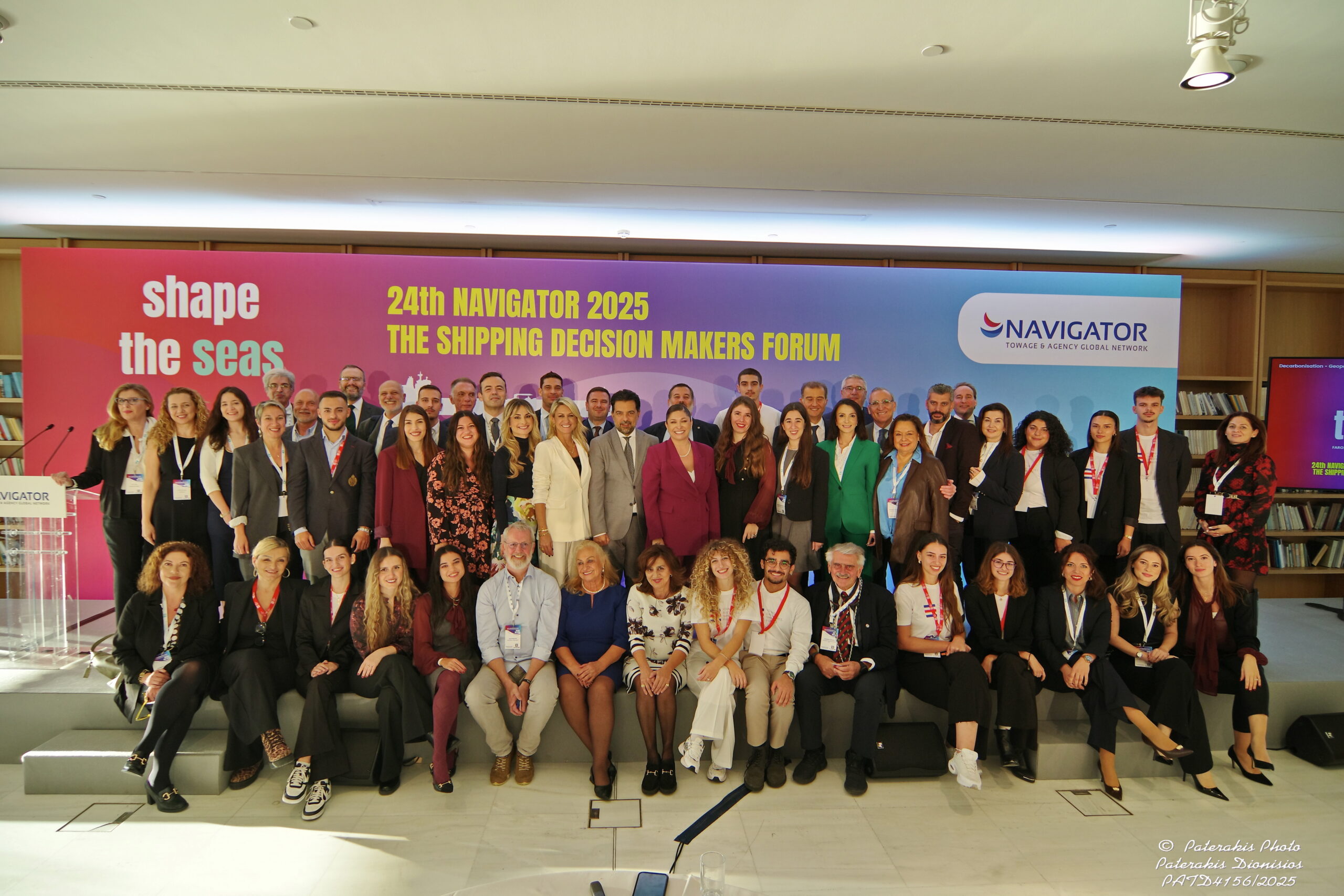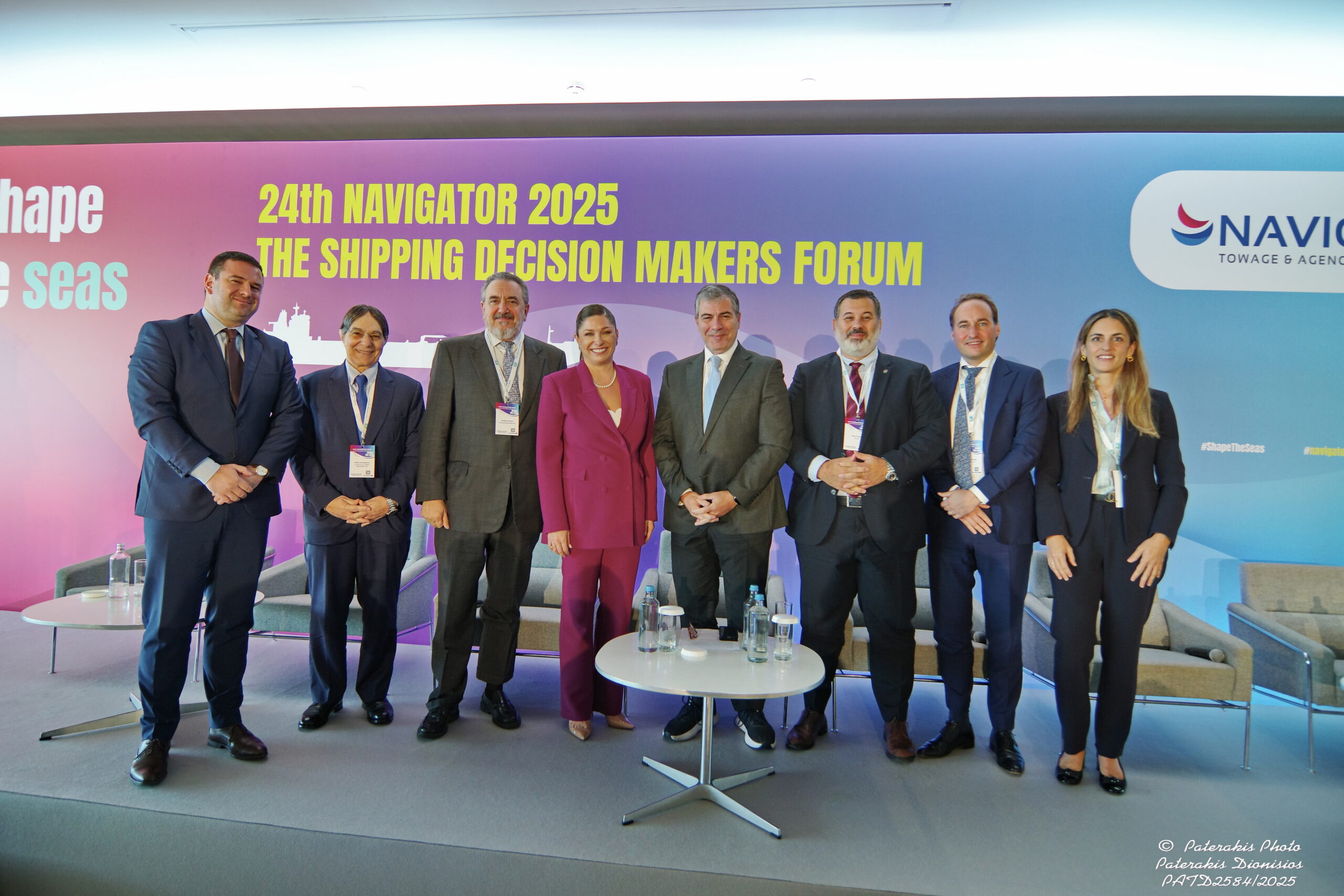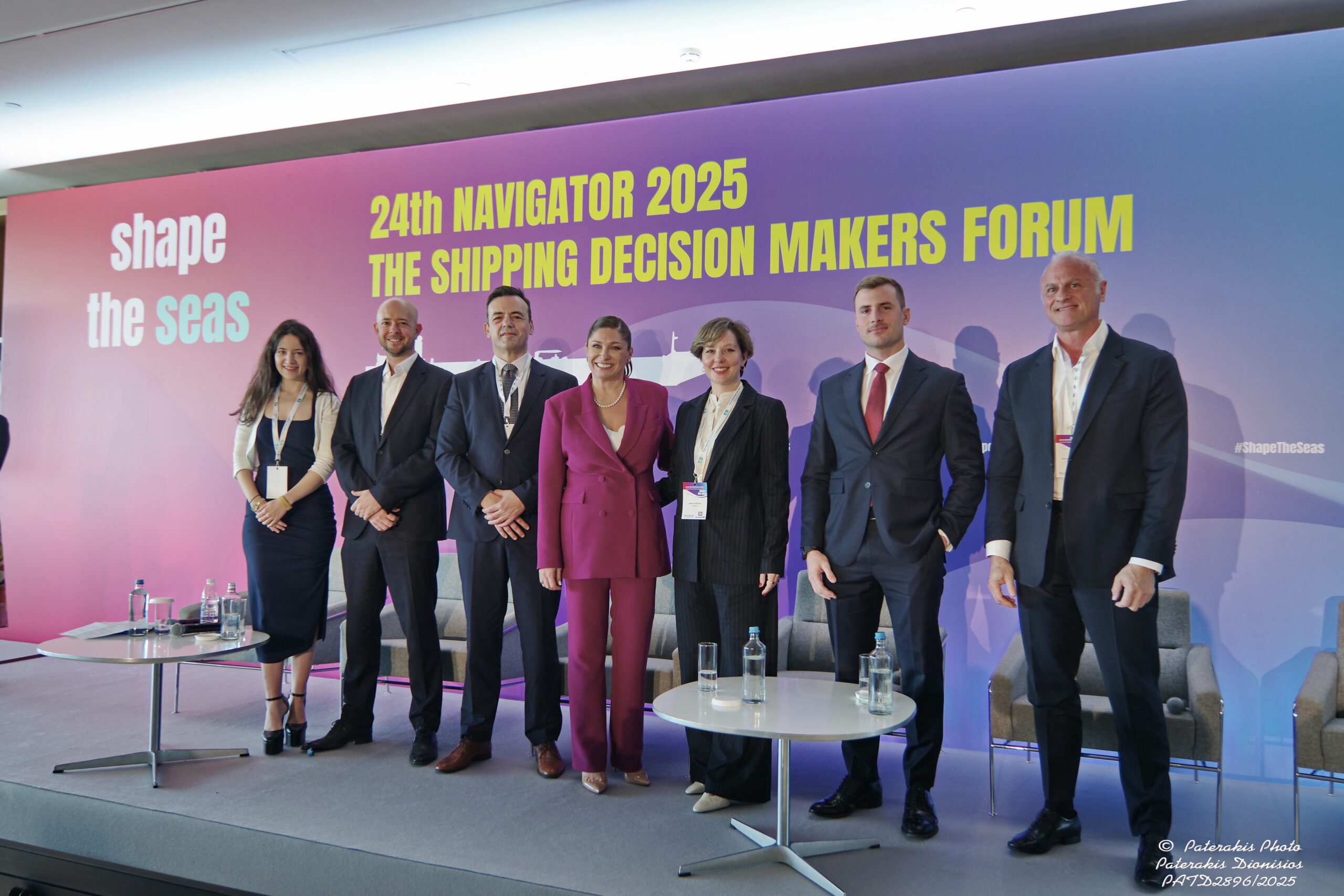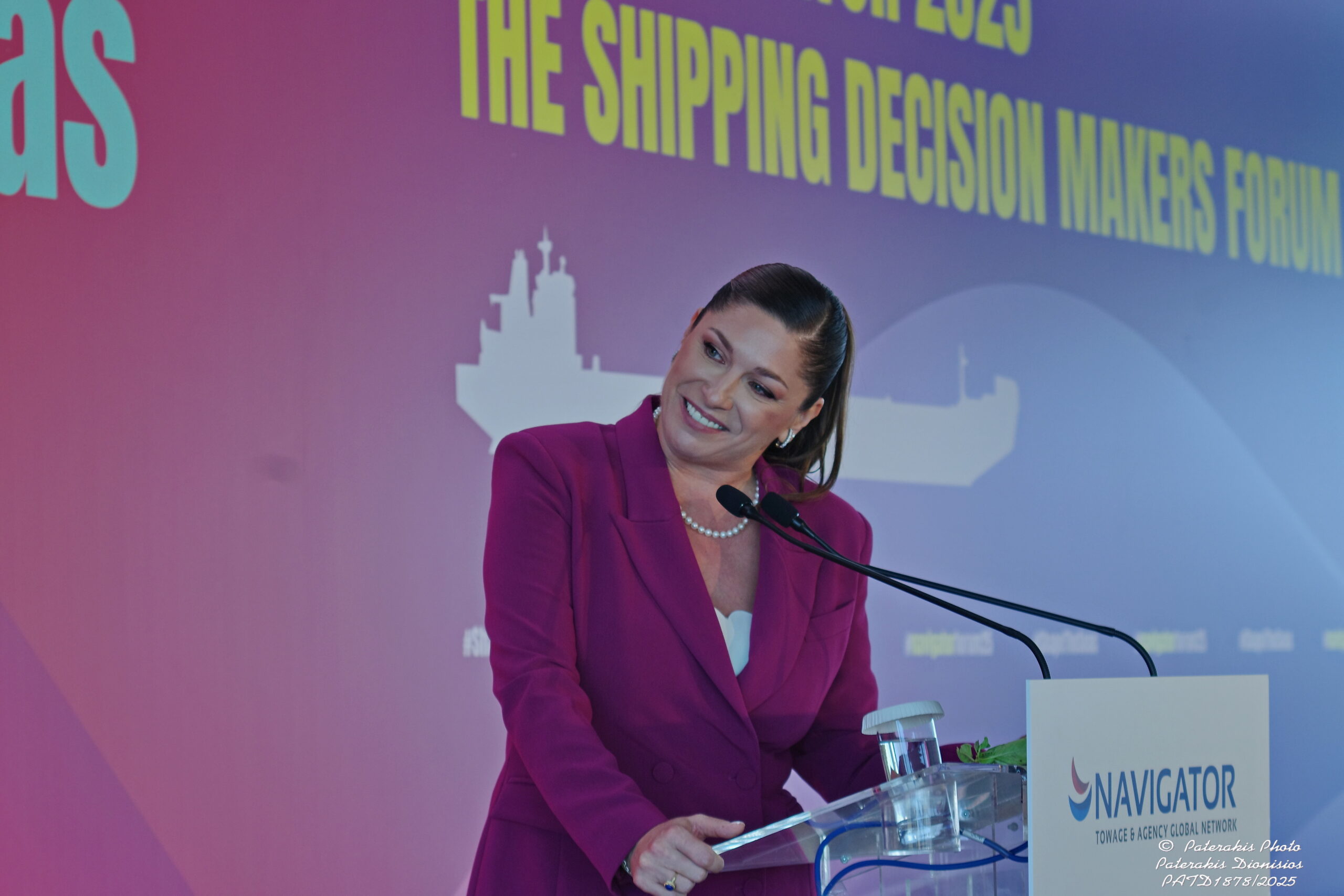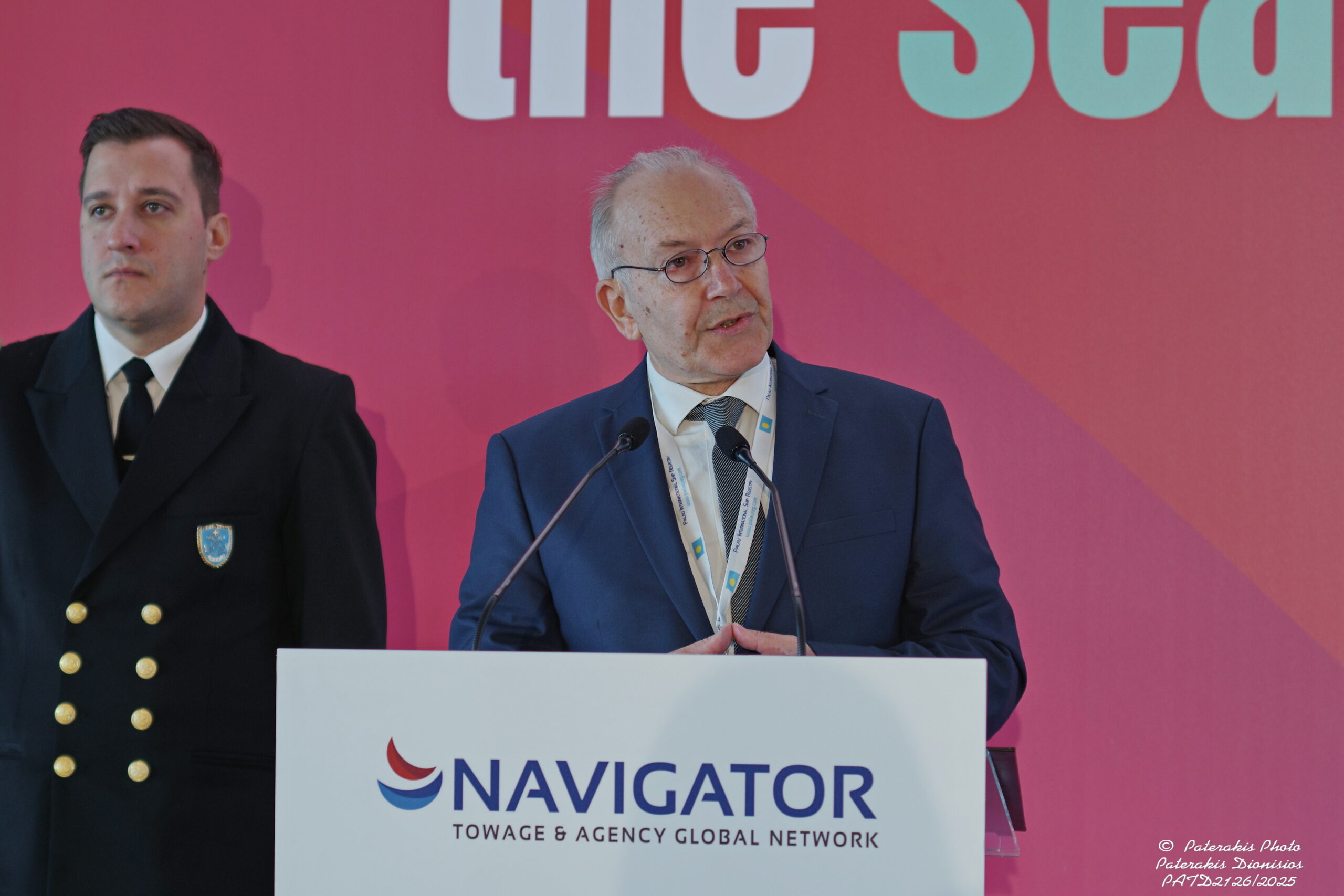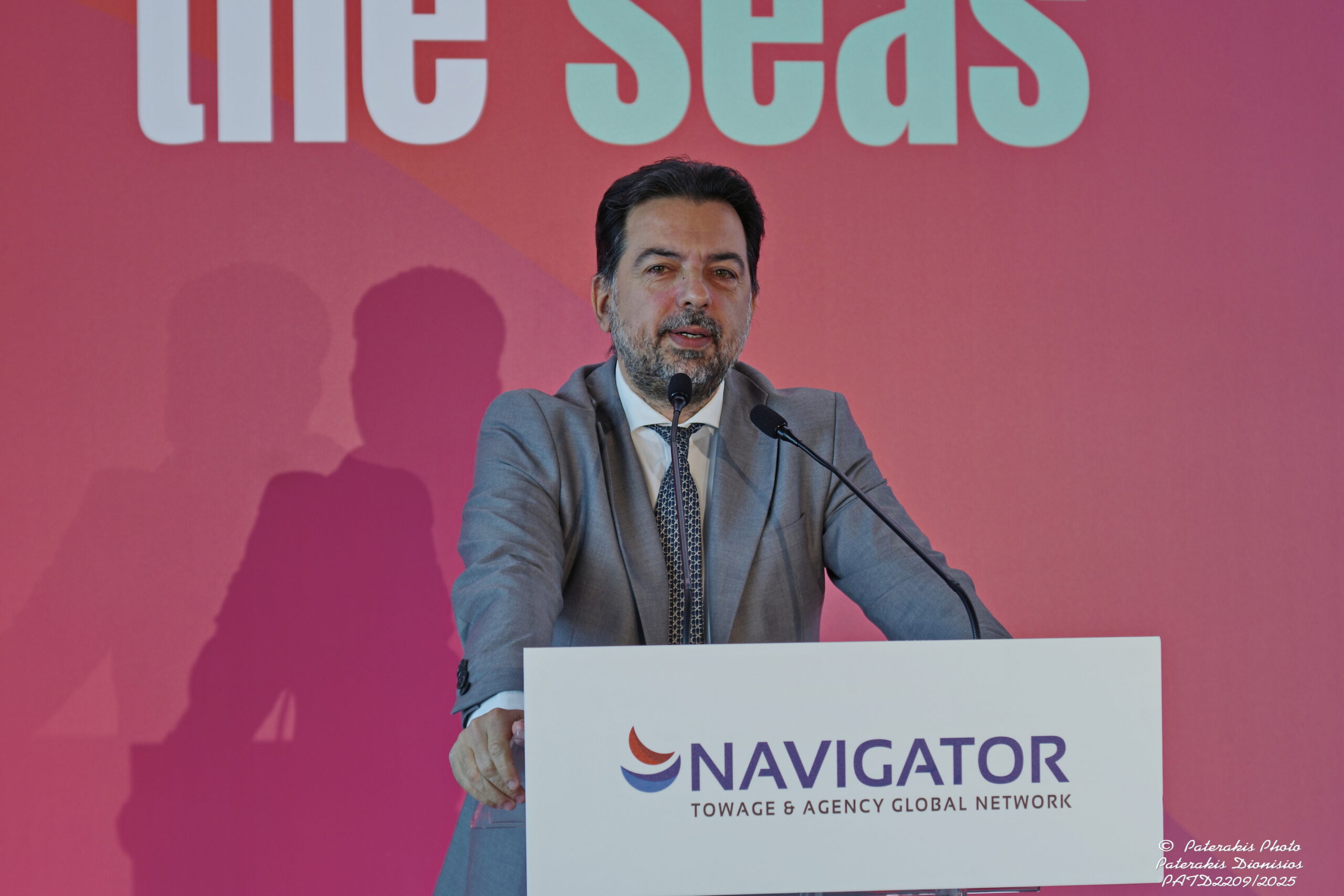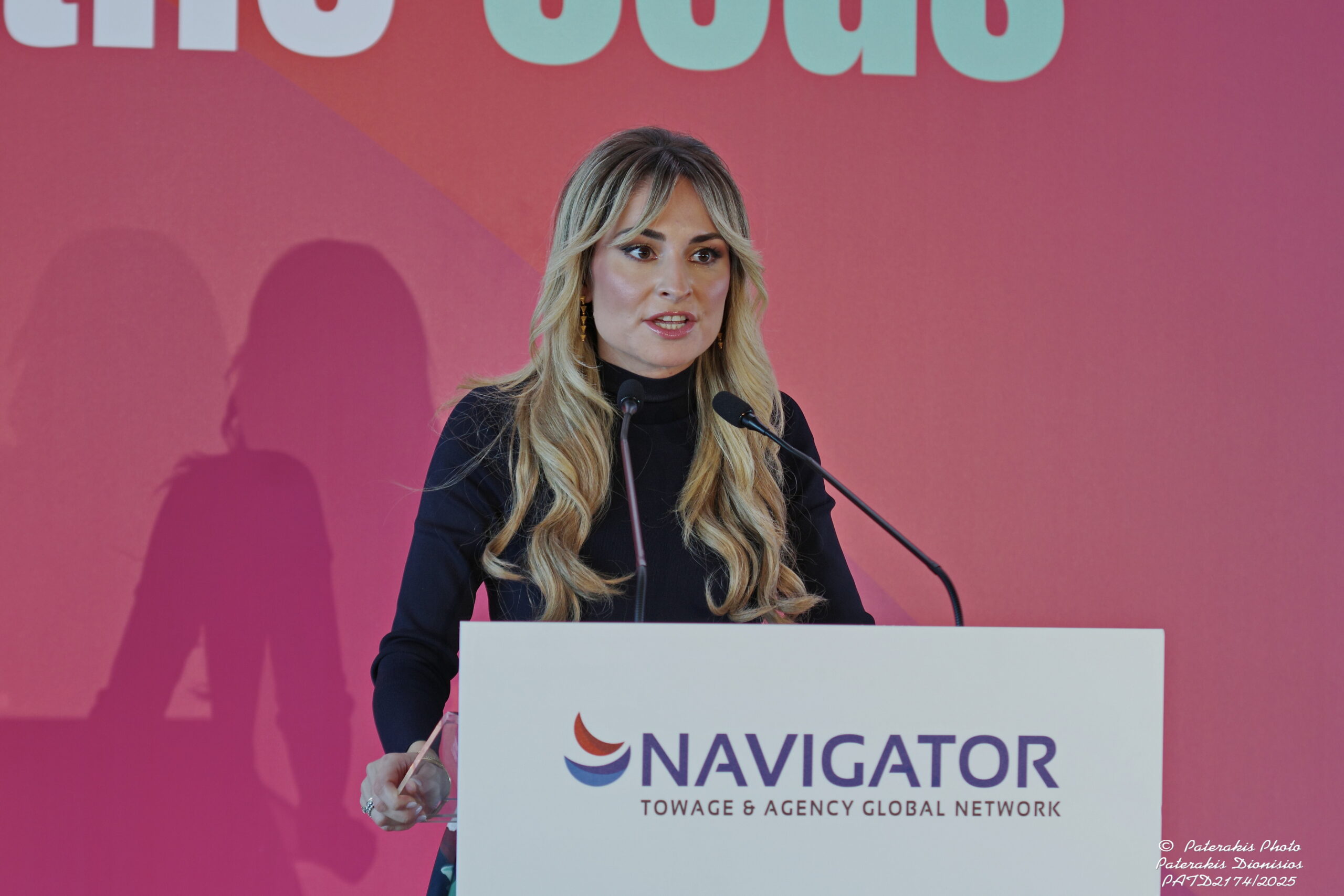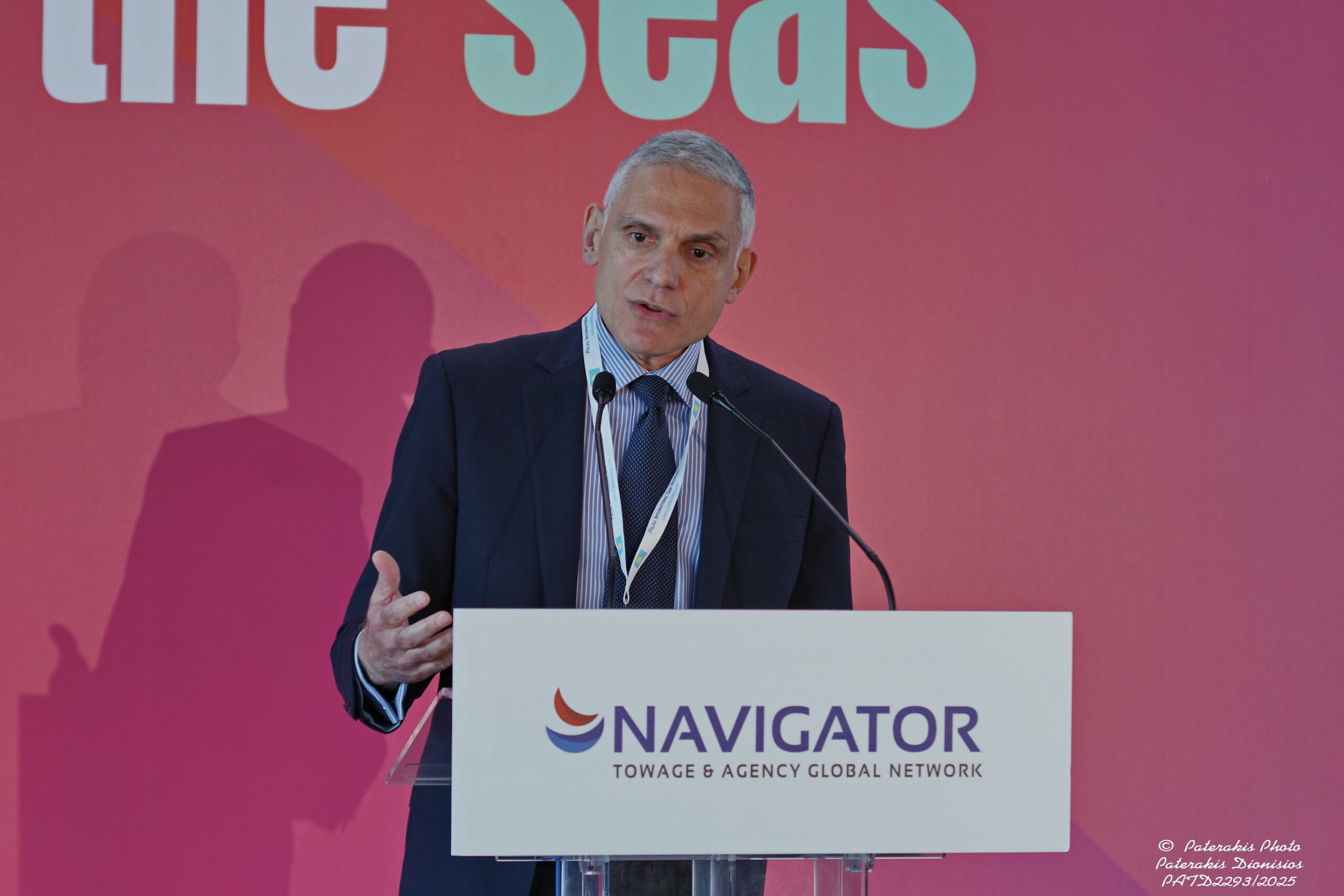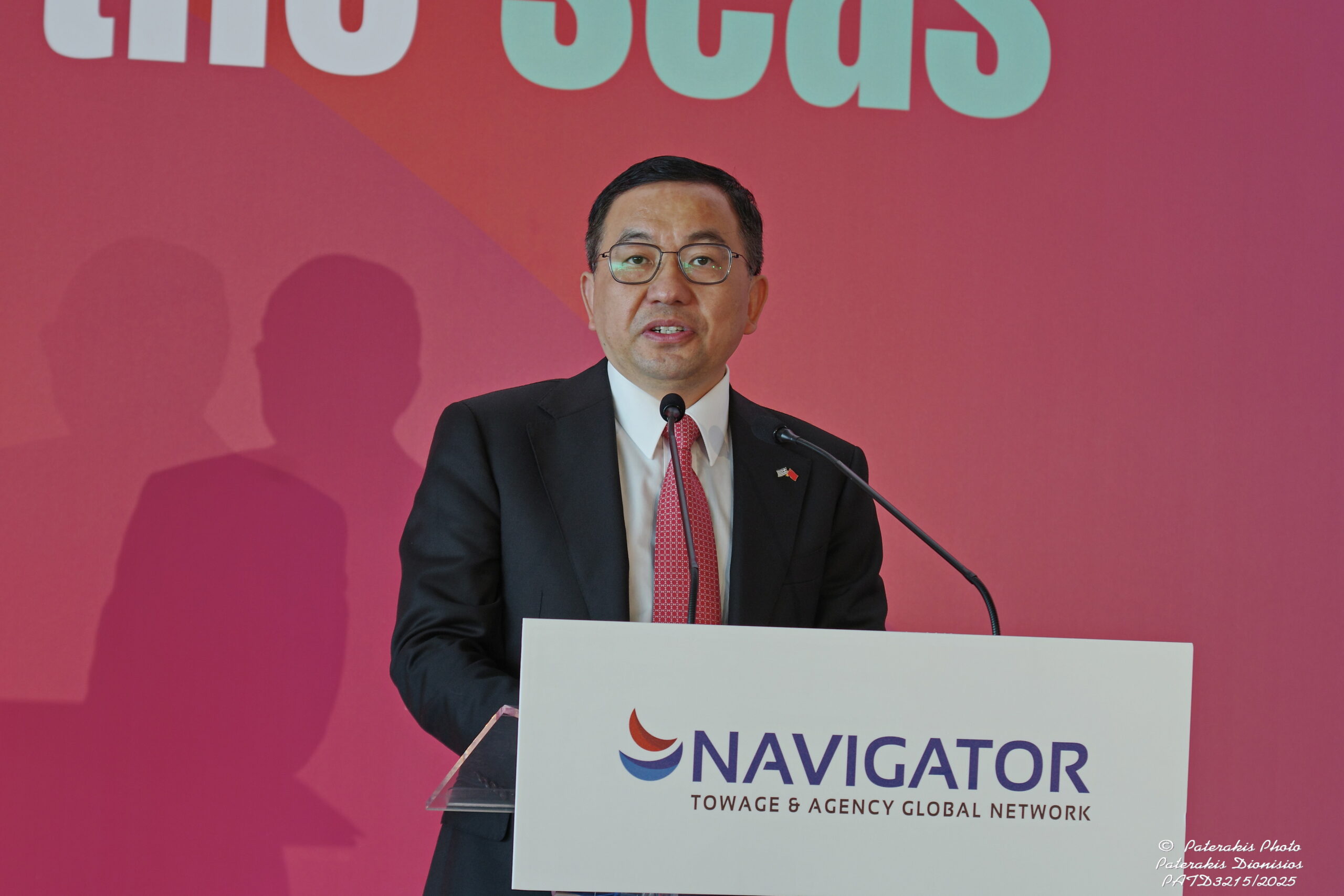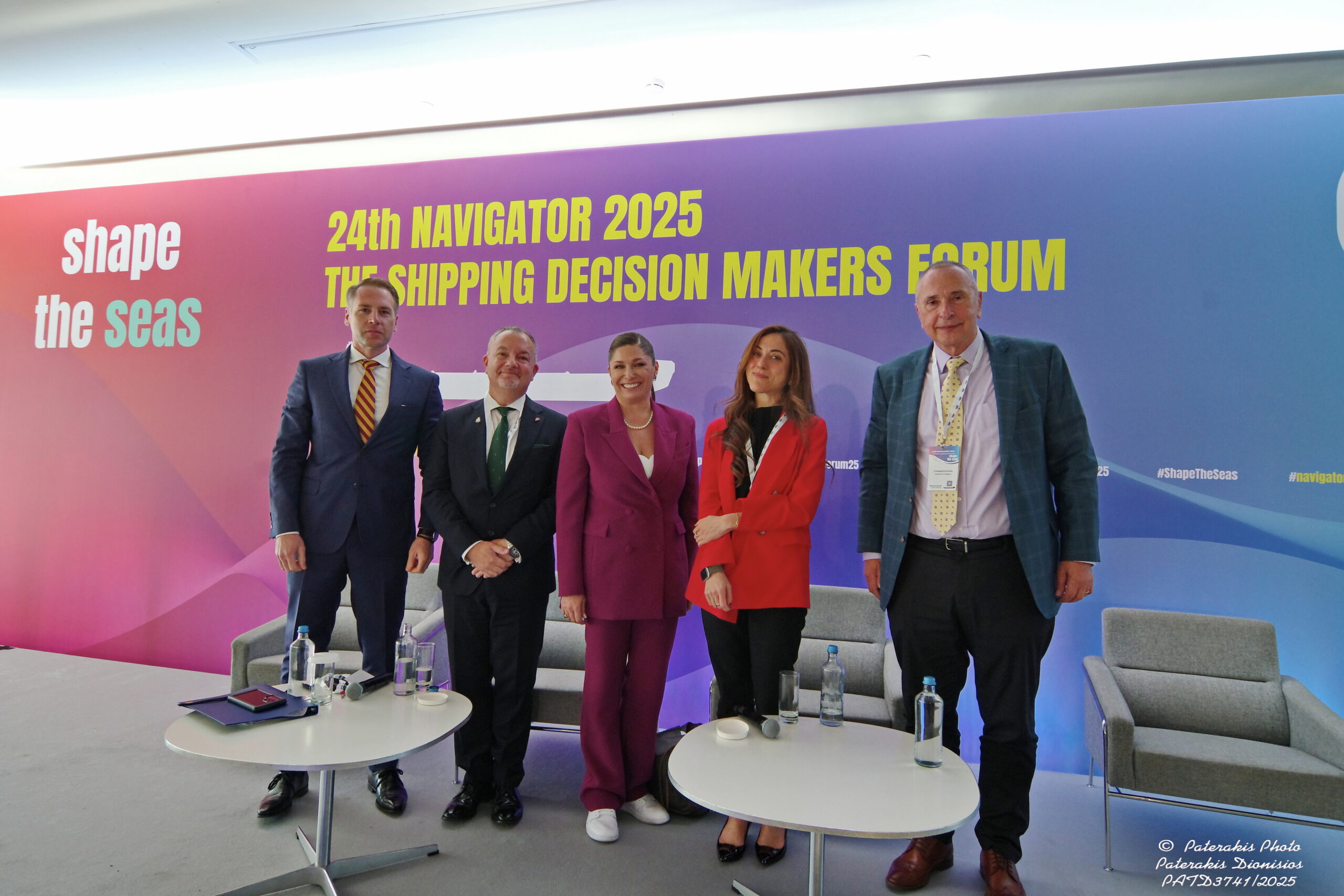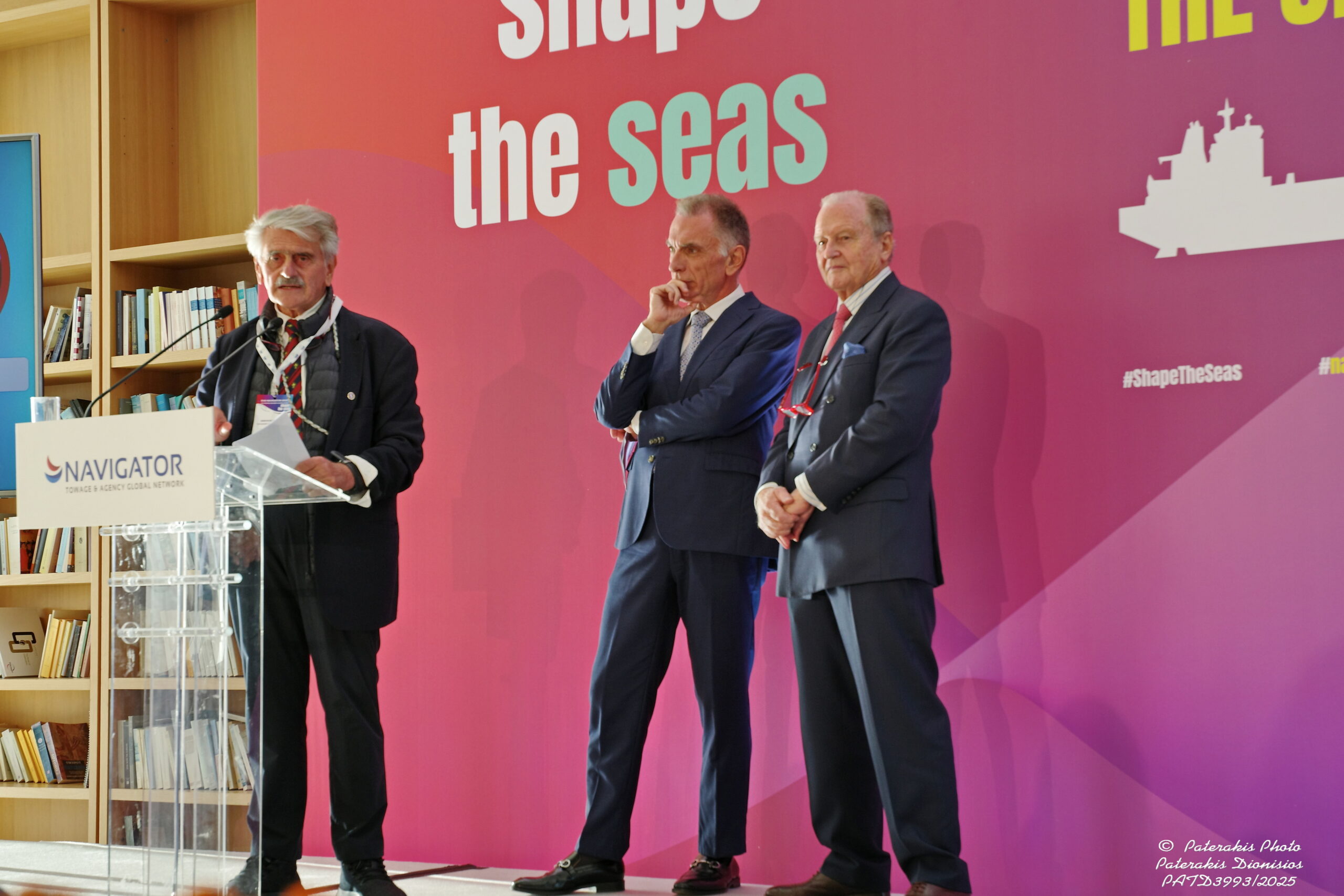Με απόλυτη επιτυχία ολοκληρώθηκε το 24ο NAVIGATOR 2025 – The Shipping Decision Makers Forum, συγκεντρώνοντας 670 κορυφαία στελέχη της ναυτιλιακής κοινότητας από 361 εταιρείες, καθώς και εκπροσώπους από 20 Πρεσβείες και 41 Ναυτιλιακούς Οργανισμούς, Ακαδημαϊκά Ιδρύματα και Λιμενικές Αρχές. Το Forum επιβεβαίωσε για ακόμη μία φορά τον ρόλο του ως πεδίο διαλόγου και ανταλλαγής απόψεων, λύσεων και καλών πρακτικών.
Οι εργασίες άνοιξαν με χαιρετισμούς από τον Υφυπουργό Ναυτιλίας και Νησιωτικής Πολιτικής Στέφανο Γκίκα, τον Πρόεδρο του Ναυτικού Επιμελητηρίου Ελλάδος, Γιώργο Αλεξανδράτο και τον Πρέσβη της Λαϊκής Δημοκρατίας της Κίνας, Α.Ε. Fang Qiu. Στο πρόγραμμα συμμετείχαν επίσης ο Πρέσβης του Ηνωμένου Βασιλείου, Α.Ε. Matthew Lodge, ενώ ο Δr. Κυριάκος Σαμπατακάκης, Country Managing Director της Accenture ο οποίος παρουσίασε μία πρωτοποριακή έρευνα για την εφαρμογή της Τεχνητής Νοημοσύνης στη ναυτιλία. Ξεχωριστή στιγμή αποτέλεσε η ομιλία του Lars Rasmussen, Συνιδρυτή του Google Maps, ο οποίος ανέδειξε τον ρόλο του digital mapping, της τεχνητής νοημοσύνης και της συνδεσιμότητας στη ναυτιλία και στο παγκόσμιο εμπόριο.
Καθ’ όλη τη διάρκεια του Forum, οι ηγετικές φωνές του κλάδου της ναυτιλίας συμμετείχαν σε υψηλού επιπέδου συζητήσεις για την απανθρακοποίση, την «έξυπνη» ναυτιλία, το ESG, το ανθρώπινο δυναμικό και τις γεωπολιτικές εξελίξεις.
Η Δανάη Μπεζαντάκου, CEO της Navigator Shipping Consultants, υπογράμμισε τη διαχρονική δύναμη της ελληνικής ναυτιλίας, θέτοντας στο επίκεντρο την καινοτομία, τη βιωσιμότητα και τη διεθνή συνεργασία. Παράλληλα, ανέδειξε την πρωτοβουλία YES Tour to Schools, η οποία φέρνει τη ναυτιλιακή εκπαίδευση άμεσα στους μαθητές όλης της Ελλάδας, μετά την εισαγωγη του μαθήματος στο πρόγραμμα εκπαίδευσης εμπνέοντας τη νέα γενιά να ακολουθήσει καριέρα είτε στη θάλασσα, είτε στη στεριά διασφαλίζοντας τη συνέχεια της ελληνικής ναυτοσύνης.
Στην ομιλία της, η Όλγα Μπεζαντάκου, Chief Legal Counsel & COO της Navigator, σημείωσε: «H Navigator Shipping Consultants εκπροσωπεί εδώ και 35 χρόνια με υπερηφάνεια ορισμένες από τις πιο αξιόπιστες και καταξιωμένες Εταιρείες Ρυμούλκησης και Πρακτόρευσης παγκοσμίως, οι οποίες δραστηριοποιούνται σε περισσότερα από 1.400 εμπορικά λιμάνια και διαθέτουν στόλο άνω των 1.000 ρυμουλκών, διασφαλίζοντας κορυφαία ποιότητα υπηρεσιών, επιχειρησιακή ασφάλεια και ανταγωνιστικό κόστος για τους Έλληνες πλοιοκτήτες.»
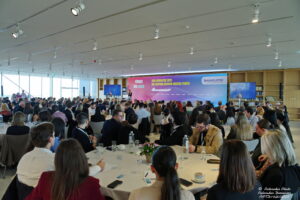
«Η Ελλάδα παραμένει παγκόσμια ναυτιλιακή δύναμη και πρωτοστατεί στη μετάβαση προς μια βιώσιμη, ασφαλή και ανταγωνιστική ναυτιλία, όπου η καινοτομία συνυπάρχει με τους ανθρώπους. Η επένδυση σε πράσινα πλοία, λιμάνια και εκπαιδευτικές δομές ενισχύει τόσο τον κλάδο όσο και τη συνοχή και ανάπτυξη των νησιωτικών μας κοινωνιών», υπογράμμισε ο Υπουργός Ναυτιλίας, Βασίλης Κικίλιας, στην ομιλία που απέστειλε.
Ο Υφυπουργός Ναυτιλίας, Στέφανος Γκίκας επισήμανε ότι η πράσινη μετάβαση πρέπει να είναι ρεαλιστική και δίκαιη, διασφαλίζοντας την ανταγωνιστικότητα της ναυτιλίας ενώ ταυτόχρονα στηρίζει τις μικρότερες επιχειρήσεις και ενθαρρύνει την ισόρροπη ανάπτυξη σε όλη τη χώρα. Ο Πρέσβης της Κίνας ανέδειξε τη στρατηγική σημασία της συνεργασίας Ελλάδας–Κίνας στη ναυτιλία, εστιάζοντας σε πράσινες τεχνολογίες, ψηφιοποίηση και «έξυπνα» λιμάνια, ενώ ανέφερε και σημαντικά επιτεύγματα της Κίνας, όπως τον πρώτο ανεφοδιασμό με πράσινη μεθανόλη στη Σαγκάη και την καθέλκυση του πρώτου αυτόνομου ερευνητικού σκάφους. Ο Δρ. Κυριάκος Σαμπατακάκης, τόνισε ότι «Η Ελλάδα διαχρονικά πρωταγωνιστεί στη ναυτιλία, έναν κλάδο που αποτελεί θεμέλιο της οικονομίας και της ταυτότητάς μας. Σήμερα, έχουμε την ευκαιρία να πρωταγωνιστήσουμε και στη νέα εποχή της τεχνητής νοημοσύνης. Η σύνδεση της εμπειρίας της ελληνικής ναυτιλίας με τις δυνατότητες της τεχνητής νοημοσύνης μπορεί να αποτελέσει σημείο αναφοράς για την ψηφιακή επανεφεύρεση του κλάδου διεθνώς.»
Κατά τη διάρκεια του πάνελ «From Oil to Green: Tradition or Transition?», συζητήθηκαν οι πολλές και συχνά σύνθετες προκλήσεις της απανθρακοποίησης, αλλά και το πώς οι γεωπολιτικές εξελίξεις, τα φορολογικά συστήματα και οι κανονισμοί του ΙΜΟ και της ΕΕ επηρεάζουν τις επιλογές καυσίμων για το μέλλον. Οι ομιλητές συμφώνησαν ότι η ναυτιλία έχει αποδείξει διαχρονικά πως μπορεί να προσαρμόζεται και να καινοτομεί. Το κλειδί, όμως, είναι να εκφράζει ενιαία φωνή στη διαμόρφωση πολιτικών — μόνο έτσι μπορούν να ληφθούν ρεαλιστικές και εφαρμόσιμες αποφάσεις για το σύνολο του κλάδου.
Στη συζήτηση «Disruption on Deck: Who Controls the Future of Smart Shipping» δεν θα μπορούσε να μην εξεταστεί ο τρόπος με τον οποίο η συνδεσιμότητα, τα δεδομένα και η τεχνητή νοημοσύνη μεταμορφώνουν τη λειτουργία των πλοίων: από την παρακολούθηση της απόδοσης σε πραγματικό χρόνο και τη βελτιστοποίηση δρομολογίων, μέχρι την προγνωστική συντήρηση των συστημάτων και την κυβερνοασφάλεια. Καθώς τα πλοία γίνονται κατά βάση ψηφιακά και κινούνται προς την αυτονομία, η διαχείριση της κυβερνοπειρατείας και σημείων που τα συστήματα είναι «τρωτά» είναι πλέον εξίσου κρίσιμη με τα παραδοσιακά μέτρα ασφαλείας. Το πάνελ τόνισε ότι η ψηφιακή μετάβαση δεν βρίσκεται πια στο στάδιο του πειραματισμού, αλλά έχει ήδη ουσιαστικό και μετρήσιμο αντίκτυπο στις καθημερινές λειτουργίες της ναυτιλίας.
Στο πάνελ «ESG as a Strategic Imperative», οι ειδικοί ανέφεραν πως το ESG έχει εξελιχθεί από μέτρο συμμόρφωσης σε στρατηγικό πλεονέκτημα. Η τεχνητή νοημοσύνη επιτρέπει πλέον real-time παρακολούθηση ESG δεικτών, ενώ τονίστηκε ότι η βιωσιμότητα ξεκινά από την ηγεσία και την εταιρική κουλτούρα.
Για μια ακόμα φορά στο πάνελ «The Human Element Onboard and Ashore» έγινε ξεκάθαρο ότι το μέλλον της ναυτιλίας στηρίζεται στους ανθρώπους της. Θέματα όπως η ψυχική υγεία, η συνδεσιμότητα εν πλω, η ανανέωση του εργατικού δυναμικού και η γεφύρωση του χάσματος των γενεών βρέθηκαν στο επίκεντρο. Παράλληλα, υπογραμμίστηκε η σημασία του mentoring, των ξεκάθαρων προοπτικών καριέρας και ενός εργασιακού περιβάλλοντος που αναγνωρίζει την εμπειρία, ενώ παράλληλα ενθαρρύνει την καινοτομία.
Η συζήτηση «Sea Power & Global Politics: Who Rules the Shipping Routes?» ανέδειξε ότι η ισχύς στη θάλασσα σήμερα δεν καθορίζεται μόνο από στρατιωτικές δυνατότητες, αλλά και από την ανθεκτικότητα και τη συνεργασία. Οι ειδικοί τόνισαν τις νέες υβριδικές απειλές —από κυβερνοεπιθέσεις μέχρι τη γεωπολιτική αξιοποίηση των θαλάσσιων οδών— υπογραμμίζοντας ότι «η εποχή του sea control σταδιακά δίνει τη θέση της στην εποχή του sea resilience».
Το Forum έκλεισε με τους Γιώργο Τσαβλίρη , Principal – TSAVLIRIS SALVAGE GROUP, Μανώλη Βορδώνη, Πρώην Πρόεδρος – THENAMARIS SHIPS MANAGEMENT Inc, και Άγγελο Παντουβάκη, Κοσμήτορας της Σχολής Ναυτιλίας του Πανεπιστημίου Πειραιά οι οποίοι μοιράστηκαν ένα κοινό μήνυμα: το μέλλον της ναυτιλίας θα είναι πράσινο, ψηφιακό, ασφαλές και ανθρωποκεντρικό. Η μετάβαση δεν είναι πλέον επιλογή — είναι ευκαιρία. Και η Ελλάδα, ως παγκόσμιος ηγέτης, βρίσκεται στην ιδανική θέση για να καθοδηγήσει αυτή τη μεταμόρφωση.
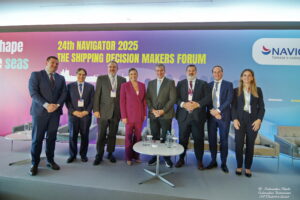
The 24th NAVIGATOR 2025 – The Shipping Decision Makers Forum concluded with remarkable success, bringing together 670 leading shipping executives from 361 companies, alongside representatives from 20 embassies and 41 shipping organizations, academic institutions, and ports. The Forum once again confirmed its position as the strategic compass for the global maritime industry.
The event opened with remarks from Stefanos Gikas, Deputy Minister of Maritime Affairs and Insular Policy, George Alexandratos, President of the Hellenic Chamber of Shipping, and H.E. Fang Qiu, Ambassador of the People’s Republic of China.
H.E. Matthew Lodge, British Ambassador to Greece, joined one of the panels, while Dr. Kyriacos Sabatakakis, Country Managing Director at Accenture, shared groundbreaking research on the application of Artificial Intelligence in shipping.
In the end, Lars Rasmussen, co-creator of Google Maps, addressed the Forum, highlighting the transformative power of digital mapping, AI, and connectivity in navigating maritime and global trade networks.
Throughout the Forum, the leading voices of Greek and international shipping engaged in high-level discussions on decarbonization, smart shipping, ESG integration, human sustainability, and geopolitics. Danae Bezantakou, CEO of Navigator Shipping Consultants, celebrated the enduring spirit of Greek shipping, emphasizing innovation, sustainability, and global collaboration. She highlighted the YES to Schools initiative, which brings maritime education directly to students across Greece, inspiring a new generation to pursue careers at sea and ensuring the legacy of the industry continues to thrive.
Olga Bezantakou, Chief Legal Counsel & COO of NAVIGATOR stated that “Navigator Shipping Consultants proudly represents some of the world’s most reputable towing companies and shipping agencies, operating in over 1,400 commercial ports worldwide with a combined fleet of more than 1,000 tugboats, ensuring top-tier service, operational safety, and competitive rates for Greek shipowners.”
Greece remains a global maritime power and is leading the transition towards a sustainable, safe and competitive shipping, where innovation coexists with people. Investing in green ships, ports and educational structures strengthens both the sector and the cohesion and development of our island societies”, underlined the Minister of Maritime & Insular Policy, Vasileios Kikilias. Deputy Minister of Shipping, Stefanos Gikas, pointed out that the green transition must be realistic and fair, ensuring the competitiveness of shipping while at the same time supporting smaller businesses and encouraging balanced development throughout the country.
The Ambassador of China underscored the strategic significance of China-Greece cooperation in shipping, pointing to sustainable green technologies, digitalization, and smart ports as key drivers for the future. He also noted China’s recent milestones, including the first green methanol bunkering in Shanghai and the launch of the world’s first autonomous research vessel. Dr. Kyriakos Sabatakakis, , emphasized: “Greece has historically been a global leader in shipping — a sector that forms both the foundation of our economy and a core part of our identity. Today, we have the opportunity to lead once again, this time in the new era of artificial intelligence. Connecting the deep expertise of Greek shipping with the capabilities of AI can become a benchmark for the digital reinvention of the industry worldwide.”
The Forum opened with the panel “From Oil to Green: Tradition or Transition?”, which examined the complex realities of maritime decarbonization, where environmental ambition intersects with geopolitical, regulatory, and commercial challenges. Fuel choices are increasingly shaped by national energy policies, taxation frameworks, and evolving IMO and EU regulations, while the slow adaptation of port infrastructure continues to hinder progress. Panelists emphasized that shipping has historically shown a remarkable ability to adapt, innovate, and self-regulate, and that a unified industry voice is essential in engaging policymakers to ensure a sustainable maritime future.
The session “Disruption on Deck: Who Controls the Future of Smart Shipping” explored how connectivity, data, and AI are reshaping operations, from real-time performance monitoring and routing optimization to predictive maintenance and cybersecurity. As vessels become more digital and move toward autonomy, managing cyber-piracy and system vulnerabilities has become as critical as traditional security measures. The panel highlighted that digital adoption is moving from experimentation to tangible operational impact.
In the “ESG as a Strategic Imperative” discussion , experts stressed that ESG has evolved from obligation to strategic opportunity. Environmental, social, and governance principles are now central to corporate identity and competitiveness. Artificial Intelligence enables real-time ESG tracking, while panelists underscored that sustainability begins with leadership and company culture.
The session on “The Human Element Onboard and Ashore: Challenges to Tackle, Solutions to Unlock” reinforced that shipping’s future depends on its people. Issues such as mental health, connectivity at sea, workforce renewal, and generational inclusion were addressed. Panelists stressed the importance of mentorship, clear career pathways, and a culture that values both experience and innovation to retain talent and ensure the sustainability of Greek seafarers.
Finally, the “Sea Power & Global Politics: Who Rules the Shipping Routes?” discussion highlighted that control of the seas is no longer solely a measure of military might but is increasingly defined by resilience and cooperation. Experts warned of hybrid threats, from cyberattacks to the weaponization of trade routes, emphasizing the need for a strategic mindset that combines geopolitical awareness with collaboration between states and the private sector. During the discussion it was noted that, “The era of sea control is giving way to the era of sea resilience,” signaling a profound transformation in the global maritime landscape.
The Forum concluded with a shared vision, by George Tsavliris, Principal – TSAVLIRIS SALVAGE GROUP, Emmanuel Vordonis, Former Chairman – THENAMARIS (SHIPS MANAGEMENT) Inc & Angelos Pantouvakis, Dean. School of Maritime and Industrial Studies – UNIVERSITY of PIRAEUS, that the future of shipping will be green, digital, secure, and human-centered. Transition is no longer optional—it is an opportunity, and Greece, as a global maritime leader, is uniquely positioned to guide this transformation.


